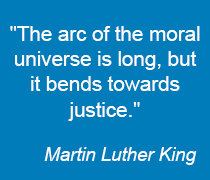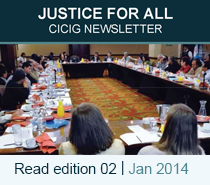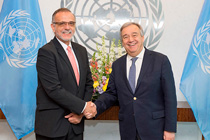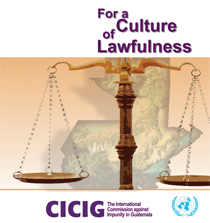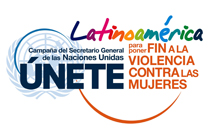|
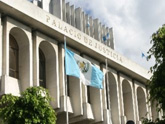 Commissioner Carlos Castresana met with the 13 Judges of the Supreme Court of Justice upon the invitation of the Supreme Court’s President, Eric Álvarez. Commissioner Carlos Castresana met with the 13 Judges of the Supreme Court of Justice upon the invitation of the Supreme Court’s President, Eric Álvarez.
This was the first meeting between both institutions and common issues regarding justice in Guatemala were discussed. “It was a visit to get acquainted. They offered me the Court’s full cooperation and at the same time, we told them that the Commission is at the Court’s disposal. The main objective is to try to address all cases. We do not expect special privilege but equal treatment in all proceedings," said the Commissioner.
In addition to the cases in which CICIG in working, there is another important aspect within the mandate: technical assistance for strengthening the institution. In that regard, the Commission will assist the Court in designing a governing program for the five years of its mandate, to ensure that its work has continuity.
CICIG and the Supreme Court plan to hold regular meetings to establish a common short, medium and long-term agenda because some issues, such as the courts for high-risk cases, are urgent. It is necessary to search for funds and locations, designate judges and obtain armoured vehicles and the required protection, all of which takes time. The Commissioner trusts in the ability of the new Court to act swiftly, thanks to the positive attitude and good will he found among the Justices.
And even though an agenda has not been adopted, the relationship between CICIG and the Supreme Court will focus on solving problems that have to do with the Court’s Criminal and Amparo Chambers such as reducing their backlog and moving forward on outstanding cases; in other words, the intention is to be more efficient and try cases expeditiously.
In the meeting, it was also agreed that the reform of the amparo is a priority. [“Amparo” is a special procedure in which an appeal for legal protection is made when there is an alleged violation of fundamental human rights.] "Not only are there too many amparo cases pending resolution, but the law encourages frivolous amparos. If you file an amparo to gain time, no court should protect you; even though the amparo itself is a very valuable tool. Therefore, we should save this instrument as a legal tool, but at the same time prevent the abuse that many times- unfortunately- is produced," emphasized Castresana.
"We talked about many topics because it was a very preliminary meeting, but we also agreed that when there is time, without today's time constraints, they will invite us to a working meeting with an agenda and then we will spend as much time as necessary reviewing the outstanding issues one by one and try- like we always do with many institutions- to make recommendations that they can either accept or reject. They are the ones responsible for making the decisions and implementing them, but the fact is that their attitude has been extremely positive," added the Commissioner.
|


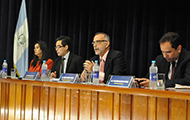
 Commissioner Carlos Castresana met with the 13 Judges of the Supreme Court of Justice upon the invitation of the Supreme Court’s President, Eric Álvarez.
Commissioner Carlos Castresana met with the 13 Judges of the Supreme Court of Justice upon the invitation of the Supreme Court’s President, Eric Álvarez.